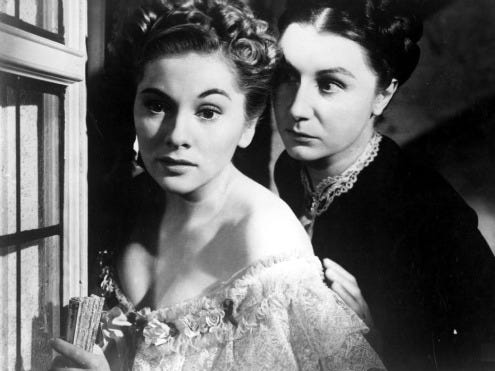And the Nominees Were — 1940

Austin Lugar, Keith Jackson and Kenny Jones started a podcast called And the Nominees Are. On this show, they are attempting to review every single Best Picture nominee starting from the very beginning. Here, Austin recaps the plot summaries of each set while teasing the longer discussions.
After watching one of the greatest years in Oscar history, the follow-up is bound to be a little disappointing. 1940 falls into a regular year of nominees where a few stand out as beloved and recognizable titles and the rest run on Turner Classic Movies a few times a year at odd hours.
"All This and Heaven Too"
Melodrama can be done well, but it can quickly slip down the path into ridiculous. After an annoying scene where Bette Davis is the new teacher, it’s time to flashback into a two-hour story that stalls way too much. There is murder and betrayal … eventually. First, it’s time to devote too many minutes to overacting and ridiculous plot turns.
"Foreign Correspondent"
Oh, I love me some Hitchcock and this is one of his most underappreciated. A journalist gets his first assignment as a foreign correspondent on the brink of World War II. The subject is assassinated on the steps, starting off a great mystery full of espionage and secret identities. There are plenty of really exciting moments including the grand finale.
"The Grapes of Wrath"
Ever since “Stagecoach”, John Ford has been more visually impressive, yet there is still something missing from a few of his movies. I’ve read the John Steinbeck novel twice now, and this adaptation doesn’t match the same difficult tone. Henry Fonda is still solid, but the world doesn’t look as desperate as it needs to be.
"The Great Dictator"
Charlie Chaplin is still remembered as one of the greatest filmmakers in the history of the medium, and this is a perfect example of why. He is taking extreme risks not only in technical achievement, but attacking a crazy man currently in power. There are a ton of hilarious scenes of physical comedy and witty lines, but what is remembered the most is the jaw-dropping monologue Chaplin gives to the camera at the end. Wow.
"Kitty Foyle"
I love Ginger Rogers and I’m thrilled she won an Oscar. I wish it wasn’t for this, though. She is fantastic in comedies like “The Major and the Minor” or any of her Fred Astaire collaborations. “Kitty Foyle” is a movie that really wants to be important but hurts any feminist message it is trying to create. It’s all about love triangles and boring decisions. Such a disappointment.
"The Letter"
It really isn’t a year with the Academy Awards if there aren't one or two movies with Bette Davis freaking out. This time, she kills a man at the beginning of the movie out of self-defense. An incriminating letter appears that reveals she may have known a bit more about what was happening. There are some good twists and scenes, but it feels compromised by having to abide to the Production Code’s tacked-on ending.
"The Long Voyage Home"
Bette Davis and John Ford. Those are the staples for the time, and with the right material they can be great. This is a bit better than “The Grapes of Wrath” because Ford controls the pacing in an unconventional way. A lot of time is spent with John Wayne and his crew on their boat. There is plenty of silence and fear throughout the film to the point where this doesn’t feel like a Hollywood film. Its unique style does leave the audience a bit detached at times, though.
"Our Town"
Oh, my. I somehow missed out on seeing any production of this Pulitzer Prize-winning gem. Instead, this was my first venture into suffering through this 90 minutes of ho-hum madness. The gimmick becomes insufferable within the first monologue, and every actor looks like a fool trying to play simple as very simple. This is still very ripe for parody.
"The Philadelphia Story"
On the other hand, this is just ripe. This Cary Grant/Katherine Hepburn/Jimmy Stewart romantic comedy still holds up as absolutely hilarious. It works as one of the best within its genre because it stays faithful to its characters. People don’t end up together because that’s the clean solution; instead, time is invested to make sure it all works. A great script and three wonderful performances by the leads.
"Rebecca"—WINNER
Did I mention I love me some Hitchcock? Two nominees in one year makes this year a treat. This film is seen as his transition film from England to America and it made quite an impression. The increase of budget allowed him to make a really creepy tale of Daphne du Maurier’s beloved novel with Laurence Olivier at his very best. It had been years since I’ve seen this, and I forgot some of the great twists. And that house? Chills. Well worth watching.
We discuss these movies with a lot more detail on our show And the Nominees Are in addition to discussing the other awards from this year. This set was covered over two episodes, both of which can be found for free on iTunes. We’d love it if you left us a review! Our show is also on Facebook, Twitter and our brand new website.
If you’d like to play along with us, the next 10 films for 1941 are “Blossoms in the Dust," "Citizen Kane," "Here Comes Mr. Jordan," "Hold Back the Dawn," "How Green Was My Valley," "The Little Foxes," "The Maltese Falcon," "One Foot in Heaven," "Sergeant York" and "Suspicion."


